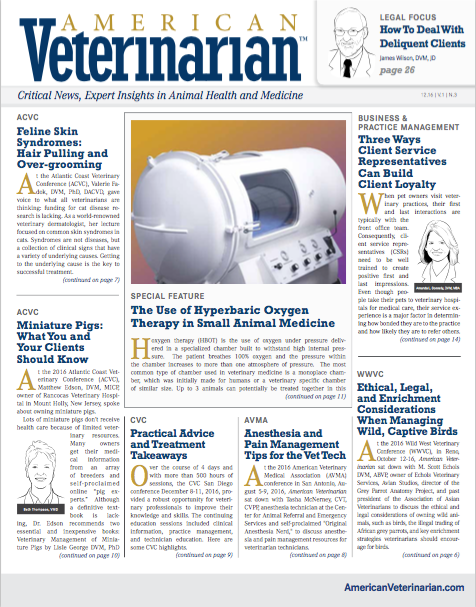CVC San Diego 2016: Practical Advice and Treatment Takeaways
Over the course of 4 days and with more than 500 hours of sessions, the CVC San Diego conference December 8-11, 2016, provided a robust opportunity for veterinary professionals to improve their knowledge and skills. The continuing education sessions included clinical information, practice management, and technician education.
Over the course of 4 days and with more than 500 hours of sessions, the CVC San Diego conference December 8-11, 2016, provided a robust opportunity for veterinary professionals to improve their knowledge and skills. The continuing education sessions included clinical information, practice management, and technician education. Here are some CVC highlights.
New Treatment Options for Canine Lymphoma
Monoclonal antibody drugs, which have been used for quite some time in humans, are designed to enlist the body’s immune system to fight cancer cells. Inspired by these advancements, the company Aratana has created canine-specific monoclonal antibody therapies, called Blontress and Tactress, for treating lymphoma in dogs. Blontress was recently approved to treat B-cell lymphoma and is meant to be used in conjunction with chemotherapy. Tactress is indicated as an aid in the treatment of T-cell lymphoma in dogs. Lymphoma is one of the most common forms of cancer in dogs and often progresses rapidly. Some of the most popular canine breeds are at the highest risk of the disease, according to Aratana.
Balancing Empathy in the Workplace
Finding the right balance between emotions and emotional boundaries is imperative for veterinarians. Kimberly Pope-Robinson, DVM, said that emotions need to be talked about rather than judged or suppressed. “I believe our emotions are our passion connecting with our physical self, and not allowing them to come out can become problematic,” Pope-Robinson said. “They can also become overwhelming, where they control us. They are our resiliency, and they are our downfall.” Although finding a balance in how our emotions affect us is not easy, it’s key for veterinary staff. Pope-Robinson warns that when our empathy is switched off, we become cynical or angry and begin to vilify others. Perhaps it is impossible to “be there” for everyone emotionally, but not connecting with others can ultimately lead to distress, as well.
More Does Not Mean Better When Handling Scared Pets
More handling of a frightened pet is not necessarily better. One of the biggest mistakes veterinary staff can make with scared patients is to hold them tighter, which may worsen a patient’s fear and anxiety and provoke retaliation. It is critical to know when a patient is becoming fearful and to use a different approach, such as backing off, changing how the patient is handled, and using treats.
Using Exam Room Technicians
To get the most out of physical exams and to maximize efficiency, veterinarians should learn to rely on exam room technicians. Leveraging them to fill out medical records and exam reports allows veterinarians time to personally connect with clients. An assistant can efficiently complete a medical report and make notes while the veterinarian completes the exam, which ultimately saves clients time, as well.
Payment Options: Keeping Clients in the Know
It is important for practices to emphasize the value of the services they offer. For example, veterinary staff should not only tell clients why their pet may need a medical procedure, but also how it will benefit the pet and the client. Regularly discussing payment options with clients is also key, and all staff members should be educated so they can answer client questions. Making a quick decision regarding their pet health can be difficult for clients, but if they know their options in advance, they can make better choices.
